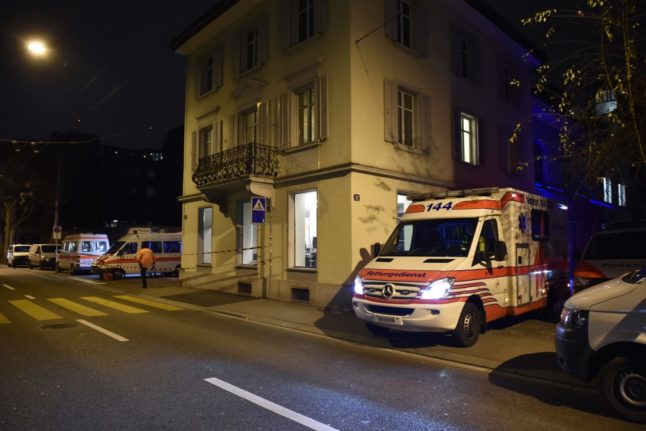In some countries it is common for people who don’t have their own doctors to go to an emergency room (ER) with all kinds of health complaints.
In some cases, they even routinely call an ambulance to take them there.
But in Switzerland the rules are different.
This is all the more relevant now, when emergency departments in a number of Swiss hospitals are understaffed and therefore already stretched to the limit.
“We didn’t think that Switzerland would be affected [by scarcity of health workers] so badly,” said Vincent Ribordy, co-president of the Swiss Society for Emergency Medicine. “We thought that the capacity of the system would be limitless, but this is not the case.”
Given this growing lack of capacity to handle patients, “people need to understand that they don’t have to come to us for every little thing, but that in many cases pharmacies, family doctors, and duty practices can help them,” he added.
So how can you know whether your symptoms are serious enough to warrant a visit to the ER?
Emergency rooms are for just that: true medical emergencies, which, if not treated quickly and immediately, can be life-threatening.
This includes (but is not limited to) heart attacks and strokes, head trauma, severe respiratory distress, heavy bleeding, serious injuries, and other conditions where any delay in treatment can put your life or health at risk.
In June 2021 the Swiss government introduced a charge of 50 francs for those people who visit the emergency room for non-urgent treatment.
It was introduced as a co-pay, meaning that the patients would have to pay out of their own pockets (i.e. it will not be covered by insurance).
However at the time no concrete indications were given as to what amounts to ’non-urgent’ treatment in the eyes of the law.
If you don’t feel well (even in the absence of the above-mentioned symptoms), you may overestimate your ailment and think it requires an urgent visit to the ER.
But before you go there, get your condition evaluated by other medical professionals. Your first point of contact should be your primary physician (GP), who can decide whether you need to go to the hospital or can be treated another way.
In the event you don’t have a GP (or are a tourist), there are other options available in Switzerland, such as medical centres and walk-in clinics in virtually all cities.
If you are not sure how serious your condition is, you can call a “duty doctor” service (Notarzt in German, médecin de garde in French). Their numbers vary by cantons; it is 0800 33 66 55 in Zurich, 022 748 49 50in Geneva, 061 261 15 15 in Basel, and 0848 133 133 in Vaud.
People who answer the phone will ask questions about your symptoms and can decide whether you need to go to the ER, require a visit from the duty doctor, or can just wait and see how your condition evolves.
A duty doctor is also an alternative to the emergency room if you start feeling ill at night, as this service responds 24/7.
Can you be turned away from the ER if your symptoms are not serious enough?
If emergency services are overcrowded, then yes, you can be turned away.
On average, ERs refuse the admission to the 30-40 percent of patients deemed non-urgent, according to Swiss Medical Review.
READ MORE: Reader question: Can my Swiss health insurance refuse to pay my medical bills?
What about calling an ambulance?
Before you dial 144 — the national number for urgent medical help — know that conditions are even stricter for ambulances than for ER visits.
A dispatcher will ask you what the nature of your emergency is, as well as other follow-up questions to determine if you need an ambulance in the first place.
Even if you are going to the ER, an ambulance will only be dispatched if you have serious, life-threatening symptoms listed above.
Otherwise, you are expected to get to the hospital by other means.
Keep in mind that the ambulance ride is not exactly cheap, ranging — depending on where you live — from about 900 to 2,100 francs.
The compulsory health insurance (KVG / LaMal) covers half of this amount, but only up to 500 francs a year if the ambulance is called when there is no immediate danger to life.
However, if ambulance is required for life-threatening conditions, KVG / LaMal will cover up to 5,000 francs of the cost of emergency transportation.
Some supplemental insurance policies guarantee a higher, or even unlimited, cover of all transportation and rescue costs.



 Please whitelist us to continue reading.
Please whitelist us to continue reading.
Member comments